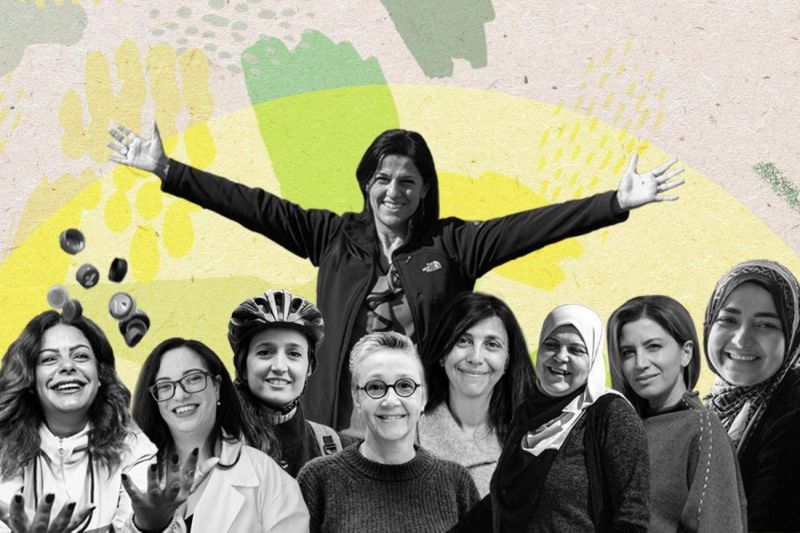Today, March 8, is International Women’s Day. On this occasion, we honor the Lebanese women who are fighting against environmental degradation and climate change and working to build a more sustainable future for the country and the global community.
Women, men and children living in Lebanon have been subjected to extreme weather for a long time. According to the Environmental Performance Index (EPIFrom Yale University in 2020, Lebanon ranks 5th in the region (out of 17 Arab countries included in the analysis) and 78th out of 180 countries in the world: people living in the country breathe unhealthy air, use polluted water and live. Areas of pollution. Decades of mismanagement and lack of investment in renewable energy sources, equal power supply systems, and public transportation have led to the failure to rely on private generators and cars, the failure of wastewater treatment, and uncontrolled industrial flow and neglect in the wake of the waste crisis.
Climate change and environmental degradation are affecting the health of the people Concerned ; For example, prolonged exposure to high levels of air pollution impairs lung function and increases the risk of pulmonary tract symptoms in humans. Similarly, according to the World Bank, this environmental catastrophe is causing significant economic damage to a country that has suffered the worst economic collapse in the world since the 19th century. In 2015, the Lebanese government estimated that climate change and environmental degradation could lead to a recession and $ 300 million a year in GDP. International experts say climate change is expected to have a direct and negative impact on Lebanon’s densely populated coastal urban areas and their agricultural productivity. Deforestation, urbanization and illegal quarries add to the list of environmental hazards in the country.
In Lebanon, local NGOs, citizens and residents are working to develop solutions to Lebanon’s environmental crisis in their communities and academies. These range from recycling to energy solutions and initiatives to purify Lebanese water.
Many of these initiatives have survived thanks to the leadership and determination of Lebanese women. On this International Women’s Day, we celebrate women – in all their diversity – who are at the forefront of environmental change across the country, even in the most difficult of circumstances. Solutions to climate change will not succeed without women. Women are at the forefront of international science and national resource management, and they are often responsible for the local and social dimensions of energy and waste management. The essential contribution of women to environmental justice in Lebanon is an extra valuable reminder of the need for diverse political leadership in the country, including the environment – that prioritizes women’s representation in resolving current crises.
Climate change is the biggest challenge of our time; Preventing this in Lebanon requires immediate action and attention. The government aims to reduce emissions in the National Climate Plan 20% by 2030The increase to the zero net commission by 2050, and the increase from the target set in 2015, is also a recent commitment to develop a long-term strategy for low emissions and resilient development strategies by 2050. These are ambitious goals; Especially considering the limited functionality we have seen so far. However, the right mix of women’s policies, abilities, incentives, political will and leadership can influence people’s behavior, encourage the right investments and mitigate the devastating effects on Lebanon’s precious environment.
Today we pay our respects – Aida Gadban, Carol Ayah, Carolyn Chaptini, Maya Nehme, Mona Fawaz, Miriam Ghzoub, Nouhad Awwad, Nadeeda Rad, Najat Saliba and be our guides and leaders. Let us celebrate their work and their contributions to making the future of Lebanon greener and more equitable and prosperous.
Through German Ambassador Andreas Kindle
Rebecca Grindley, Ambassador of Australia
Renനെ Paul AMRY, Austrian Ambassador
Hubert Kouraman, Ambassador of Belgium
Boyan Belev, Bulgarian Ambassador
Chandel Chastenay, Ambassador of Canada
Panayotis Kiriako, Ambassador of Cyprus
Mereto JUHL, Ambassador of Denmark
Dorothy SHEA, United States Ambassador
Miko Haljas, Ambassador of Estonia
Jose Maria Ferreira de la PA, Ambassador of Spain
Tarja Fernandes, Ambassador of Finland
Anne Grillo, Ambassador of France
Catherine Foundoulaki, Ambassador to Greece
Sean O’Reilly, Ambassador of Ireland
Nicolette Bombardier, Ambassador of Italy
Jose Ignacio Madraso, Ambassador of Mexico
Martin YTTERVIK, Ambassador of Norway
Hans Peter van der Wood, Ambassador of the Netherlands
Przemysław NIESIOLOWSKI, Ambassador de Polon
Jiri Dolessel, Ambassador of the Czech Republic
Ambassador of Romania Radu-Catalin Mardare
Ian Collard, Ambassador of the United Kingdom
Marek Varga, Ambassador of Slovakia
Shani Kalyaneratne Karunaratne, Ambassador of Sri Lanka
Ann Dismore, Ambassador of Sweden
Ralph TARRAF, Ambassador of the European Union
Joanna Roneka, Special Coordinator for the United Nations in Lebanon
Najat Rochdi, Deputy Special Coordinator and Resident and Humanitarian Coordinator in Lebanon
Melanie Havenstein, UNDP Resident Representative
Rachel Dor-Weeks, UN Women Chief in Lebanon
Today, March 8, is International Women’s Day. On this occasion, we honor the Lebanese women who are leading the fight against environmental degradation and climate change, who are working to build a more sustainable future for the country and the global community. Women, men and children living in Lebanon have long been dedicated. Time…

Prone to fits of apathy. Unable to type with boxing gloves on. Internet advocate. Avid travel enthusiast. Entrepreneur. Music expert.



